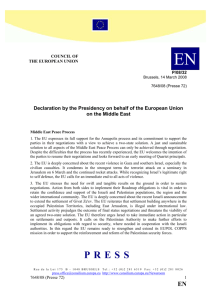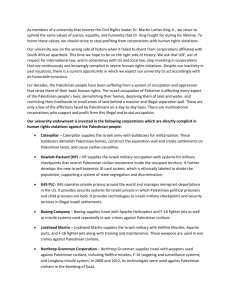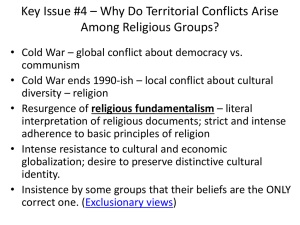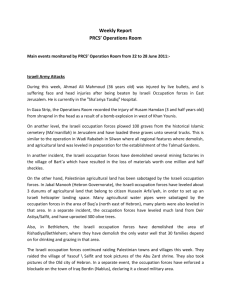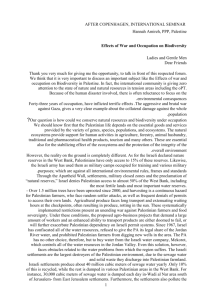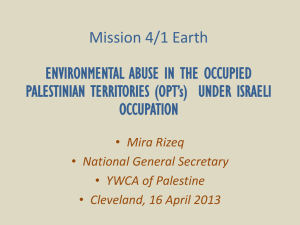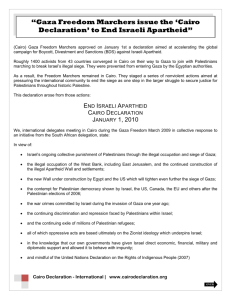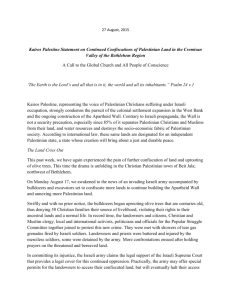Is Israeli occupation akin to colonialism, apartheid? by Kanaga Raja
advertisement
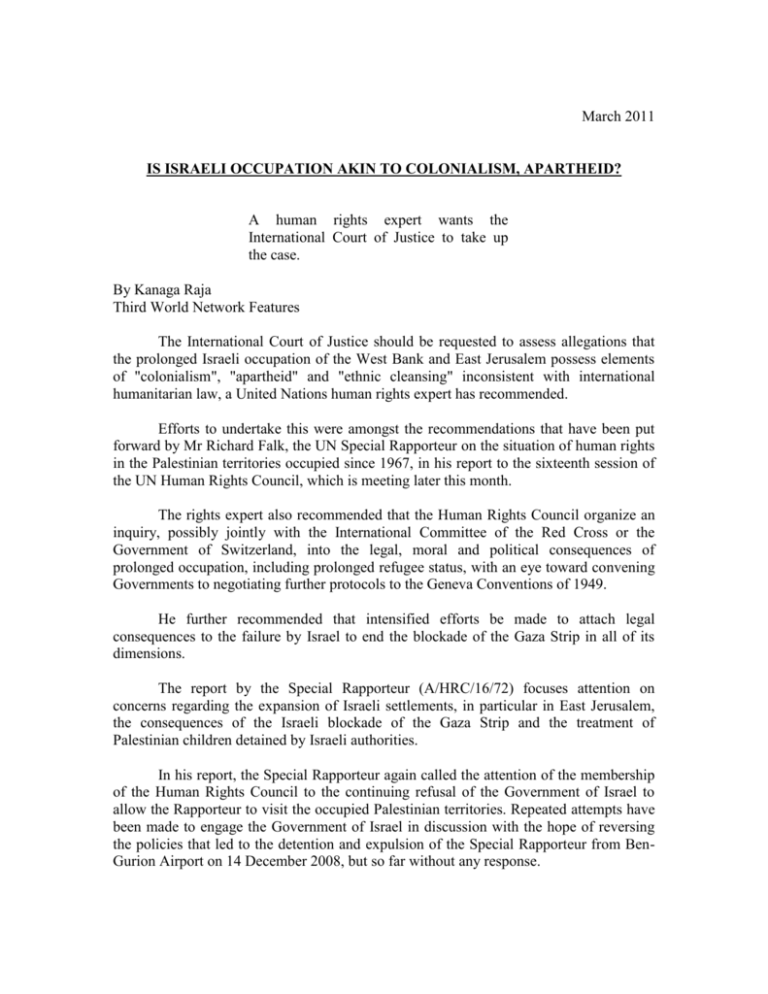
March 2011 IS ISRAELI OCCUPATION AKIN TO COLONIALISM, APARTHEID? A human rights expert wants the International Court of Justice to take up the case. By Kanaga Raja Third World Network Features The International Court of Justice should be requested to assess allegations that the prolonged Israeli occupation of the West Bank and East Jerusalem possess elements of "colonialism", "apartheid" and "ethnic cleansing" inconsistent with international humanitarian law, a United Nations human rights expert has recommended. Efforts to undertake this were amongst the recommendations that have been put forward by Mr Richard Falk, the UN Special Rapporteur on the situation of human rights in the Palestinian territories occupied since 1967, in his report to the sixteenth session of the UN Human Rights Council, which is meeting later this month. The rights expert also recommended that the Human Rights Council organize an inquiry, possibly jointly with the International Committee of the Red Cross or the Government of Switzerland, into the legal, moral and political consequences of prolonged occupation, including prolonged refugee status, with an eye toward convening Governments to negotiating further protocols to the Geneva Conventions of 1949. He further recommended that intensified efforts be made to attach legal consequences to the failure by Israel to end the blockade of the Gaza Strip in all of its dimensions. The report by the Special Rapporteur (A/HRC/16/72) focuses attention on concerns regarding the expansion of Israeli settlements, in particular in East Jerusalem, the consequences of the Israeli blockade of the Gaza Strip and the treatment of Palestinian children detained by Israeli authorities. In his report, the Special Rapporteur again called the attention of the membership of the Human Rights Council to the continuing refusal of the Government of Israel to allow the Rapporteur to visit the occupied Palestinian territories. Repeated attempts have been made to engage the Government of Israel in discussion with the hope of reversing the policies that led to the detention and expulsion of the Special Rapporteur from BenGurion Airport on 14 December 2008, but so far without any response. It should be pointed out that the Government of Israel has also not cooperated with other recent important initiatives of the Human Rights Council relating to the occupied Palestinian territories, including the report of the United Nations Fact-Finding Mission on the Gaza Conflict (A/HRC/12/48) and the report of the independent international fact-finding mission to investigate violations of international law, including international humanitarian and human rights law, resulting from the Israeli attacks on the flotilla of ships carrying humanitarian assistance (A/HRC/15/21), he said. "This pattern of non-cooperation with official undertakings of the Human Rights Council should produce a concerted attempt by this organ and the Office of the SecretaryGeneral to do what can be done to obtain the future cooperation of the Government of Israel." The Special Rapporteur believed that there are important issues of language that arise from the cumulative effects of Israeli violations of international humanitarian law, human rights law and criminal law. It becomes misleading to treat these violations as distinct behavioural instances disconnected from broader consequences that are either designed by intention or the natural outcome of accumulating circumstances (so-called "facts on the ground"), he said. These concerns about language are accentuated because Israel is the stronger party in diplomatic settings and generally enjoys the unconditional support of the United States. Indeed, said the Special Rapporteur, unlawful Israeli behaviour that starts out as "facts" have over time been transformed into "conditions", or in the words of the US Secretary of State, Hilary Clinton, "subsequent developments" that are treated as essentially irreversible. Such transformation is true of several aspects of the occupation, including at a minimum the settlement blocs and accompanying infrastructure of roads and security zones, as well as the separation wall. To call appropriate attention to the effects and implications of these unambiguously unlawful patterns, and their somewhat perverse ex post facto attempted "legalization" and "normalization" requires stronger expository language to better understand the unbridled assault upon Palestinian rights and prospects for meaningful self-determination. The Special Rapporteur said that it is against this background that this report has decided to employ such terms as "annexation", "ethnic cleansing", "apartheid", "colonialist" and "criminality" as more adequately expressing the actual nature of the situation in the occupied Palestinian territories. Such labels can be perceived as emotive, and admittedly require a finding by a court of law to be legally conclusive. However, such language, in the Special Rapporteur's view, more accurately describes the realities of the occupation as of the end of 2010 than the more neutralseeming description of factual developments that disguises the structures of this 2 occupation which has undermined the rights of the Palestinian people under international law for 43 years. Against this background, the Special Rapporteur deemed it appropriate at this time to renew the call of the former Special Rapporteur on the occupied Palestinian territories, John Dugard, for a referral of the situation to the International Court of Justice for an authoritative decision as to whether, "elements of the [Israeli] occupation constitute forms of colonialism and of apartheid". The Special Rapporteur said that "the dual discriminatory structure of settler administration, security, mobility, and law as compared to the Palestinian subjugation seems to qualify the long Israeli occupation of the West Bank as an instance of apartheid." The referral to the International Court of Justice should also seek clarification as to whether the pattern of continuing unlawful settlement, manipulation of residence credentials, and expulsions in East Jerusalem qualify as "ethnic cleansing" and, if so, how this behaviour should be viewed from the perspective of the international law of belligerent occupation, he added. The Special Rapporteur was also of the belief that there are grounds for concern with respect to maintaining the rights of the Palestinian people in relation to the inducements offered to Israel to extend the partial moratorium on settlement expansion. He said that it is important to bear in mind that the unlawfulness of the settlements has been confirmed over and over again by reference to the textual language of article 49(6), of the Fourth Geneva Convention, by decisions and resolutions of the General Assembly and the Security Council and by numerous statements on the part of respected world leaders. "Therefore, providing Israel with substantive benefits for temporarily and partially halting an unlawful activity that infringes on Palestinian prospects for selfdetermination raises disturbing issues of principle and precedent." "There can be no positive significance to a negotiating process that incorporates an acceptance and legitimization of Israeli settlements and their infrastructure of roads, which constitute a fundamentally unlawful dimension of the prolonged Israeli occupation of the West Bank and East Jerusalem," he added. In this respect, said Mr Falk, only a permanent commitment to freeze settlement growth would signal the minimal good faith required to support the belief that peace talks are a viable path at this stage to reach the essential goals of Palestinian self-determination and a sustainable peace with security for both peoples. The report highlighted the continuing expansion of settlements in the occupied Palestinian territories. 3 The report said that the Israeli 10-month self-delimited "moratorium" on settlement expansion in the West Bank expired on 26 September 2010, leading to the breakdown of the briefly resumed peace process and giving rise to lengthy negotiations aimed at re-establishing the moratorium that have now been abandoned. It noted several points in this context, pointing out firstly that the 10-month moratorium did not stop settlement construction but only slowed the pace of expansion in some parts of the West Bank; it did not purport to freeze settlement construction in occupied East Jerusalem; and in the West Bank, settler construction of public facilities such as schools and community centres as well as thousands of housing units already under construction continued unabated during the moratorium. Building frenzy in fact took place following the end of the moratorium and construction resumed on numerous housing projects which suggests that the moratorium merely delayed their construction rather than stopping them. The magnitude and persistence of the settlement phenomenon warrant concern that the occupation is a form of “colonialist annexation that has been established with a clear intention of permanence," it added. On the continuation of the Gaza blockade, the Special Rapporteur has found that the situation of the civilian population in Gaza continues to be of critical concern. In 2010, Israeli uses of force resulted in 58 Palestinians killed in Gaza (including 22 civilians) plus 233 Palestinians injured (including 208 civilians). Despite the announced easing of the blockade after the flotilla incident of 31 May 2010, the dire humanitarian situation persists in Gaza. The most recent statistics available, for instance, suggest that an average of 780 truckloads per week of humanitarian goods had entered Gaza in late November 2010 (as compared to 944 truckloads after the reported easing of the blockade on 20 June 2010) and this total was only 28 per cent of the weekly average before the blockade was imposed in June 2007. According to a recent report by 25 non-governmental organizations, Gaza requires 670,000 truckloads of construction material to rebuild after the Israeli assault in January 2009. However, the Israeli authorities have only permitted an average of 715 truckloads per month since the "easing" of restrictions in June 2010. "At this rate, it will take 78 years to rebuild Gaza, with a completion date in 2088," said the Special Rapporteur. There has also been no increase in industrial fuel since the beginning of 2010. As a result, total available electricity is 40 per cent below the estimated daily demand and daily power cuts of up to 12 hours negatively affect such essential services as water supply, sewage treatment and removal, and health facilities. 4 "These facts demonstrate the persistence and unlawful character of the blockade, being both a form of unlawful collective punishment amounting to a crime against humanity and a denial of material necessities to a civilian population living under occupation in violation of international humanitarian law," said the report. The Special Rapporteur also drew attention to several reports of the abuse of Palestinian children by Israeli authorities in the West Bank including East Jerusalem in 2010. Mr Falk said that he utterly deplored and strongly condemned the fact that, since 2000, 1,335 Palestinian children have been killed as a result of Israeli military and settler presence in the occupied Palestinian territories. The arbitrary opening of fire by Israeli military against Palestinian children is particularly appalling, he said. The Special Rapporteur was further dismayed at the continual arrests and detention of Palestinian children by Israeli authorities. In 2010, Israeli authorities arrested children at checkpoints, off the street or, most commonly, from the family home. The report also noted that each year, approximately 700 Palestinian children (under 18) from the West Bank are prosecuted in Israeli military courts after being arrested, interrogated and detained by the Israeli army. "The failure to uphold minimum standards in relation to the treatment of Palestinian children detained and imprisoned is an extreme violation of Israeli obligation to do all that is possible, subject to reasonable security measures, to respect the status of protected persons as mandated by the Fourth Geneva Convention." Among his recommendations are that efforts be undertaken to have the International Court of Justice assess allegations that the prolonged occupation of the West Bank and East Jerusalem possess elements of "colonialism", "apartheid" and "ethnic cleansing" inconsistent with international humanitarian law in circumstances of belligerent occupation and unlawful abridgements of the right of self-determination of the Palestinian people. – Third World Network Features. -ends- About the writer: Kanaga Raja is the Editor of the South-North Development Monitor (SUNS) in Geneva, Zwitzerland. The above article is reproduced from SUNS #7087, 14 February 2011. 5 When reproducing this feature, please credit Third World Network Features and (if applicable) the cooperating magazine or agency involved in the article, and give the byline. Please send us cuttings. And if reproduced on the internet, please send the web link where the article appears to twnet@po.jaring.my. Third World Network is (http://www.twnside.org.sg) also accessible 3661/11 6 on the World Wide Web
